#Bill Paley
Text
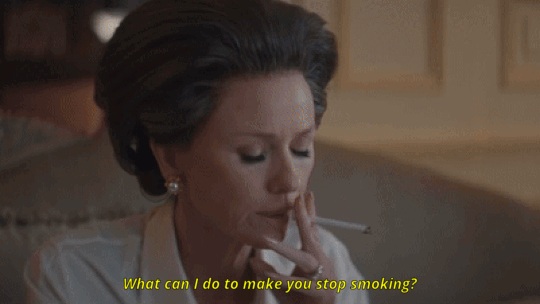


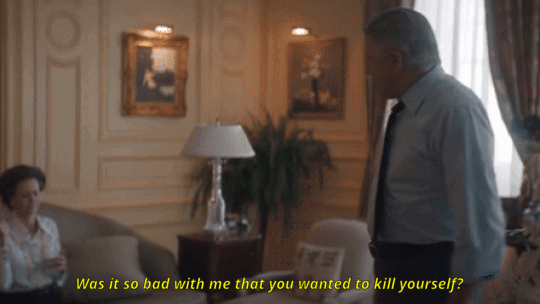
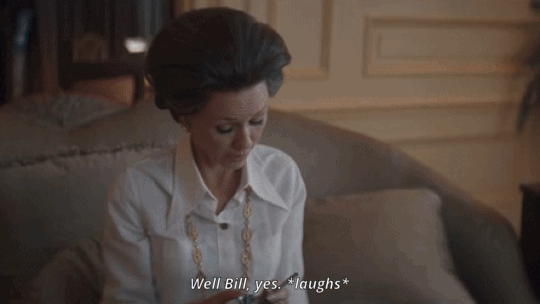
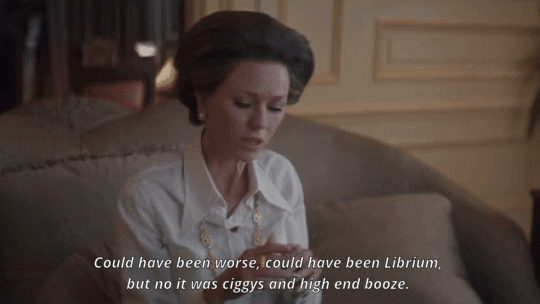

Naomi Watts and Treat Williams as Babe and Bill Paley in Feud: Capote vs The Swans 🦢.
#feud#naomi watts#babe paley#bill paley#treat williams#feud capote vs the swans#capote#truman capote#ryan murphy#my gif#gif#gifset#gifs#tv gifs#oceancentury#tv and film
26 notes
·
View notes
Text
Babe Paley

With friend Slim Keith in Nassau, 1952.
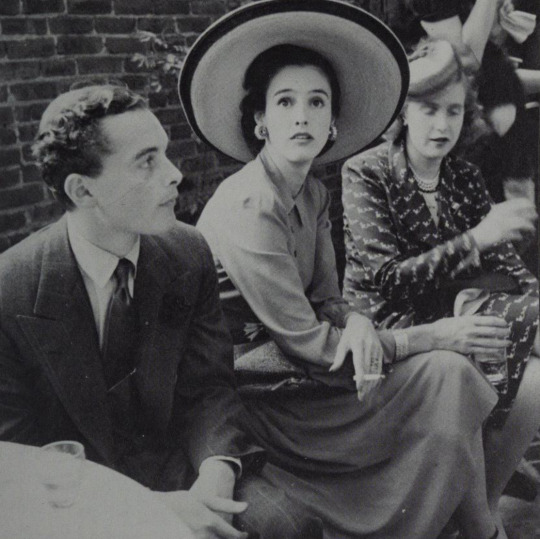
Barbara Cushing with Hugh Chisholm, Jr., 1940s.
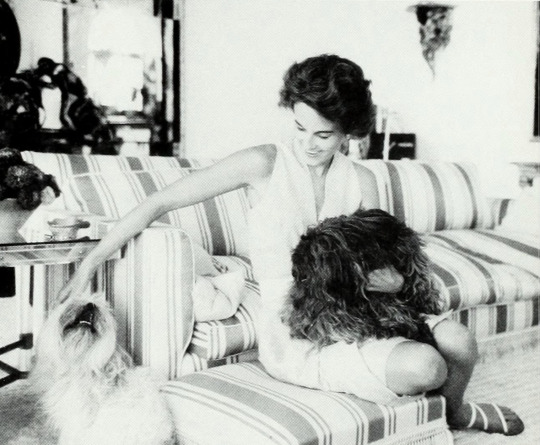
Photo by William S. Paley.
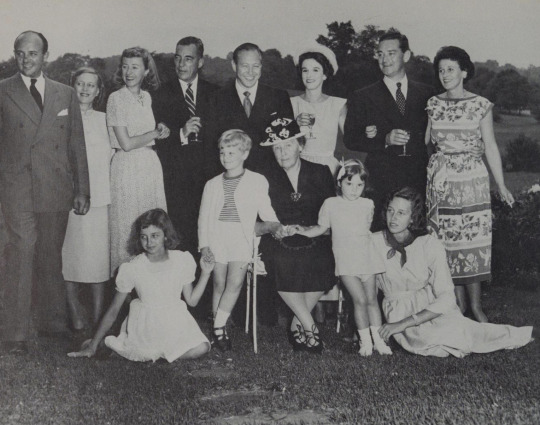

Babe Paley on her wedding day to her second husband William S. Paley, July 28, 1947.
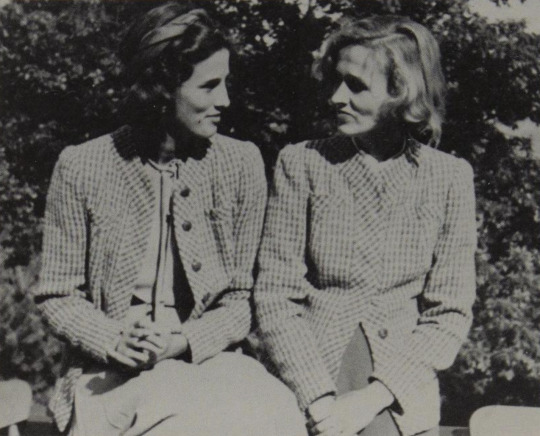
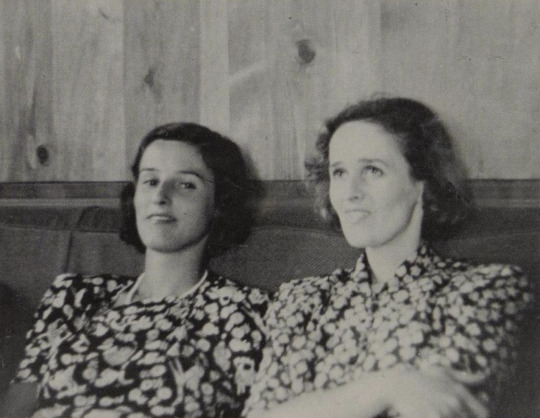
Babe and sister Betsey.

Mr. & Mrs. Stanley Mortimer on their wedding day, 1940.
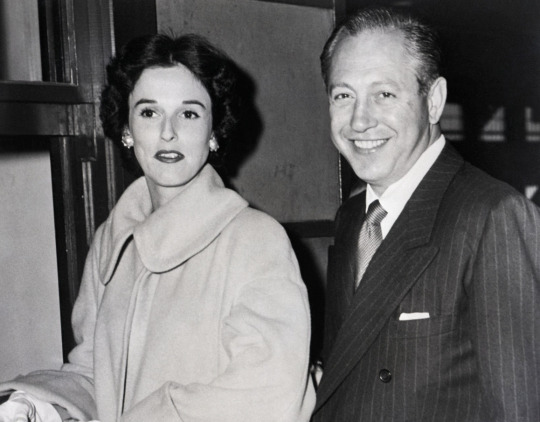
Babe and Pill Paley, 1950s.
#babe paley#barbara cushing#barbara cushing mortimer paley#swan#feud capote vs the swans#swans of fifth avenue#capote vs the swans#truman capote#cushing sisters#candid#style icon#fashion icon#slim keith#bill paley#1940s#1950s#1930s#old money#wealth#elite#vintage icons#media mogul#socialites#socialite#new york society#high society#cafe society#ladies who lunch#vogue#wedding
15 notes
·
View notes
Text
LUCY & THE SWANS
BALL, CAPOTE & PALEY

The new FX series "Feud: Capote vs. The Swans" depicts a world that Lucille Ball knew all too well - wealth, fame and celebrity. Although she does not inhabit the New York Society of Babe Paley, Slim Keith, Ann Woodward, C.Z. Guest, Gloria Guinness and others, she and her Desilu empire lie just outside of it - her influence on the era keenly felt.
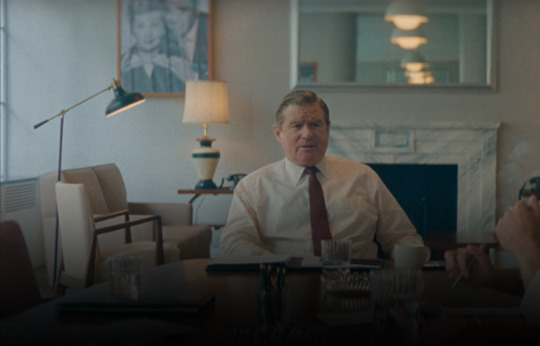
Episode 1 of the teleplay ("Pilot") begins in 1958, and takes us to the executive boardroom of CBS in New York. There, Bill Paley (Treat Williams) holds forth, a photo of Lucy and Desi prominently hovering over his shoulder.

In this room, the Paley and the CBS brass made programming moves played out on a schedule board. The Monday 9pm time slot is occupied by "I Love Lucy", with a small photo of Lucy and Desi (the same one that hung on the wall) tucked into the title card - as if they needed reminding of who they were! The only slight faux pas is that "I Love Lucy" (as a half hour series) did not run in 1958. Its final episode aired in May 1957. It then became an hour-long celebrity-driven musical comedy hour under the banner of "The Westinghouse Desilu Playhouse." Paley and CBS probably wanted Lucy and Desi for a 7th season, but Desi had other plans. He wouldn't kill the Ricardos (metaphorically) but relegate them to specials, interspersed with Desilu productions of new drama and comedy. It is possible that the action of "Feud" in this scene lies somewhere in that murky period between Desi's plans, and Paley's wishes for a seventh season of the half-hour format.

In actuality, during 1958, the 9pm Monday time slot was occupied by "The Danny Thomas Show" (filmed at Desilu) and "The Ann Sothern Show" (produced by Desilu). Monday also featured the Desilu Western "The Texan," making the only half hour of CBS's Monday primetime NOT created by Lucy and Desi "Father Knows Best."
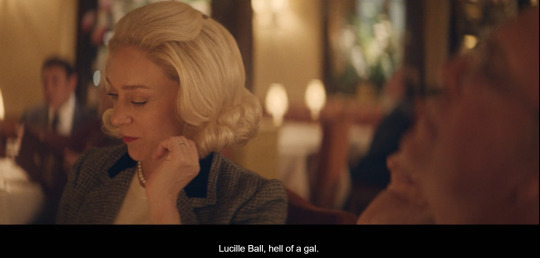
Episode 6 ("Hats, Gloves, and Effete Homosexuals") set in 1978 includes a luncheon conversation at La Cote that mentions Lucille Ball and Lucie Arnaz. Truman's new boyfriend Rick (Vito Schnabel) is a handyman who once fixed Ball's air conditioner in Palm Springs.

Truman has promised to bring Rick to see They're Playing our Song on Broadway starring Lucie Arnaz. Rick says that he met little Lucie while she was swimming laps.
BILL & BABE PALEY
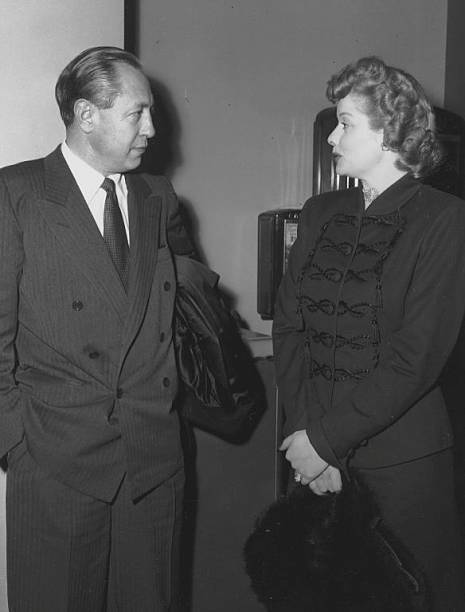
The power and influence of William S. Paley cannot be underestimated. He literally built CBS (the Columbia Broadcasting System) from a small radio station to a multi-media conglomerate, serving as Chairman for much of its existence. He shepherded CBS from radio to television, and was responsible for giving the green light to Lucille Ball making the transition from "My Favorite Husband" to "I Love Lucy," bringing her real-life husband along for the ride. Without Paley and Lucy, CBS would not have gotten a foothold in an industry dominated by the National Broadcasting Corporation (NBC).
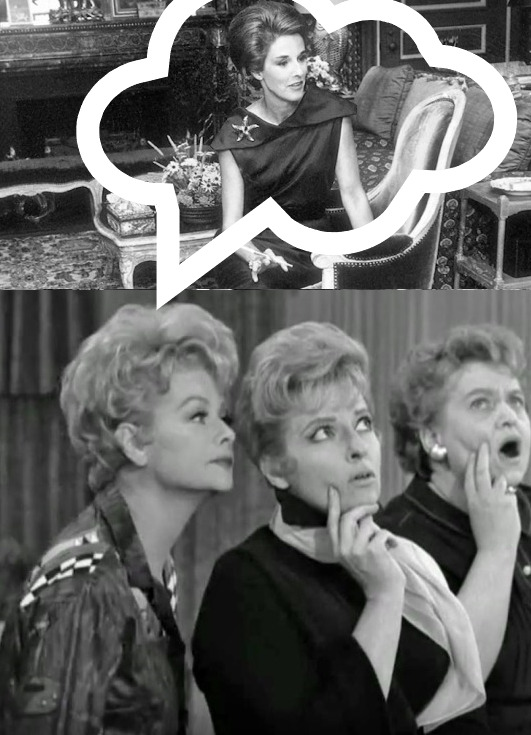
Paley's second wife was socialite Barbara Cushing Mortimer, who he married the year before he met Lucille Ball. Mortimer is best known as Babe Paley, and she was Truman Capote's favorite of the Swans. In "Lucy's Barbershop Quartet" (1963), the group needs to find a replacement singer for the group and Viv suggests the unseen character of Barbara Cushing, who is a soloist in their church choir. Although Lucy, Viv, Thelma, and Dorothy were definitely not swans (more like Danfield Ducks) the writers were tipping their hat to the big boss's wife.

A few years later, in "Lucy Meets Danny Kaye" (1964), Kaye telephones Bill Paley to see if he has any spare tickets for his show to give fan Lucy. The best he can do is tickets to "The Jackie Gleason Show." Paley does not appear, nor do we hear his voice.

In real life, Paley and Ball were both in the first group of inductees to the Television Academy Hall of Fame in 1984. Ball and Paley sat at the same table together at the ceremony.
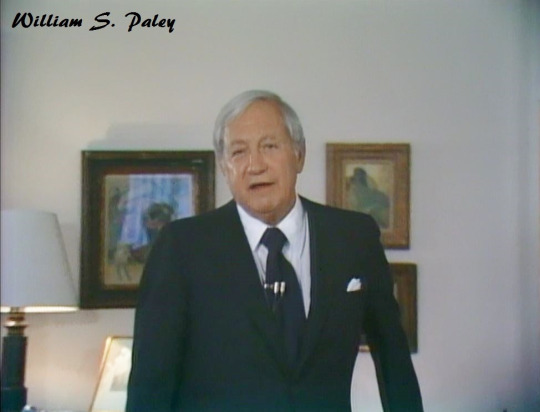
In 1976, he joined those paying tribute to Lucy on "Lucy and CBS: The First 25 Years." Paley and his wife Babe had homes in Manhasset Long Island, and Squam New Hampshire, respectively known as Kiluna Farm South, and Kiluna Farm North, where they entertained a myriad of celebrities, Lucille Ball among them.
TRUMAN CAPOTE

On screen Lucille Ball had little to no interaction with writer Truman Capote. But in her personal life, Ball was guest at at least one of his lavish parties. Gary and Lucy's photo album included a photo of the Mortons at a December 13, 1975 party hosted by Capote, Allan Carr, and John O'Shea in Lincoln Heights, a wealthy neighborhood of Los Angeles. The 'mug shot' was part of a party game where guests were 'arrested' and forced to pay bail in order to get released. The money was usually donated to the host's favorite charity.
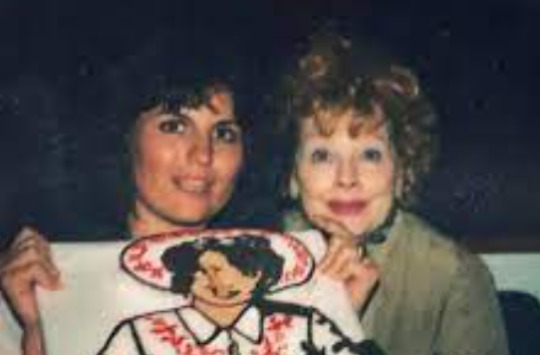
In July 1978, Capote joined Lucille Ball at Westbury Music Fair to see Lucie Arnaz perform in "Annie Get Your Gun".
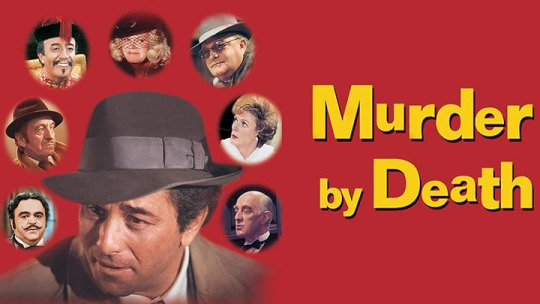
Capote's one foray into acting was in Neil Simon's Murder By Death (1976), a camp comedy send-up of Agatha Christie-style murder mysteries where Capote played the eccentric host, Lionel Twain. The film featured a few stars with close connections to Lucille Ball.
Peter Sellars (Sidney Wang) starred in Will The Real Mr. Sellars...?, an oddball film from 1969 with a very brief cameo by Lucille Ball courtesy of hidden camera footage.
Elsa Lanchester (Jessica Marbles) famously guest-starred on "I Love Lucy" as a woman who may - or may not be - a hatchet murderess. In 1973, she appeared on "Here's Lucy" as kooky bank robber Mumsie Westcott.
Although screen writer Neil Simon never wrote for Lucille Ball, or even appeared on the same screen with her, they did share credits on two television shows. He was a staff writer on “The Garry Moore Show,” which Lucy appeared on in 1960. Simon and Ball were both featured on “Bob Hope’s World of Comedy” (1976), but were not onstage at the same time. It was Lucie Arnaz who worked closest with Simon. She starred on Broadway in They’re Playing Our Song (for which Simon wrote the libretto) in 1978. She then took over the role of Bela in Simon's Pulitzer Prize-winning Broadway play Lost in Yonkers in 1992.
MISC. SWANS
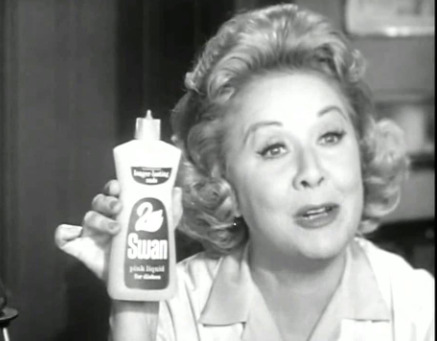
Vivian Vance doing an in-character commercial for Swan dish soap on "The Lucy Show." Swan was made by Lever Brothers, and was discontinued in 1974.
SWAN SONGS

LUCY: "Would you begrudge an expectant swan her song?"
RICKY: "You seem to forget that this particular swan has no talent." ~ Lucy's Show Biz Swan Song (1952)
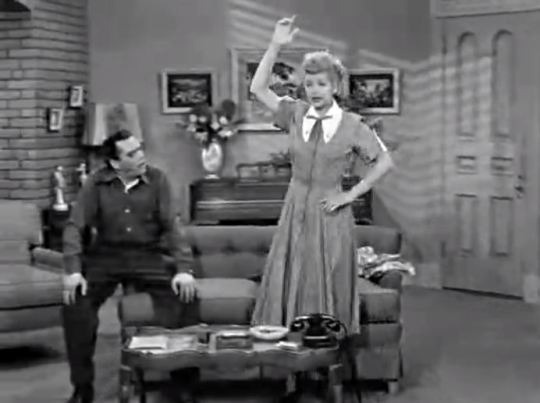
LUCY: “It’s time for that swan to hit the come-back trail.”
FRED: “That swan’s got a little ham in it.” ~ The Indian Show (1953)
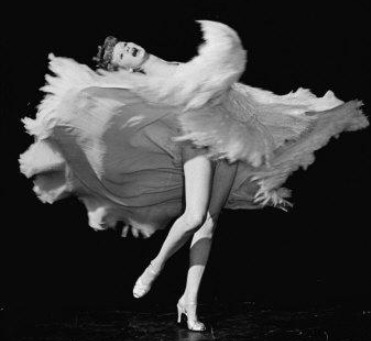
#Capote and the Swans#Truman Capote#Swans#Feud#Feud: Capote vs the swans#Bill Paley#William Paley#Babe Paley#Capote#Paley#CBS#TV#Lucille Ball#Desi Arnaz#I Love Lucy#1958#Murder By Death#Vivian Vance#Lucie Arnaz#Gary Morton#Danny Kaye#Treat Williams
11 notes
·
View notes
Text
Such Good Friends: A Novel of Truman Capote & Lee Radziwill by Stephen Greco #ARC #NewBooks #May2023Books #BookReview #NetGalley
There's a new book coming out about the relationship between Truman Capote and one of his "swans," Lee Radziwill, otherwise known as Jackie Kennedy's younger sister. #LeeRadziwill #TrumanCapote #InColdBlood #JackieKennedy #BlackandWhiteBall #BookReview
On a Thursday morning in May 1961, a well-mannered twenty-one-year-old named Marlene enters the Fifth Avenue apartment of Lee Radziwill to interview for the position of housekeeper and cook. The stylish wife of London-based Prince Stanislaw Radziwill, Princess Lee is intelligent and creative, with ambitions beyond simply jet-setting. But to the public, she is always First Lady Jackie Kennedy’s…
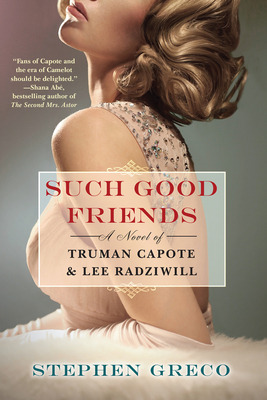
View On WordPress
#Audrey Hepburn#Bill Paley#Black and White Ball#Book Review#Breakfast at Tiffany&039;s#Gore Vidal#Historical Fiction#In Cold Blood#Jackie Kennedy#jacqueline kennedy#John Scognamiglio Books#Kensington Books#Lee Radziwill#May 2023 Books#New Books#Prince Stanislaw Radziwill#Truman Capote
0 notes
Text
It's that time of the month again . . .
. . . when we see and read what others have said that made an impact. May these quotes bring about an impact for you as well. Enjoy!
All of us who professionally use the mass media are the shapers of society. We can vulgarize that society. We can brutalize it. Or we can help lift it onto a higher level. — William Bernbach, member, Advertising Hall of Fame
The voyage of discovery is not in…
View On WordPress
0 notes
Text
As much as I love Peyton and Haley….pickled eggs just ain’t it! 🤢 🤮
#one tree hill#one tree hill rewatch#oth#oth rewatch#mugi watches one tree bill#paley#heyton#peyton sawyer#haley james scott#peyton x haley#haley x peyton#non anime#has anyone ever eaten pickled eggs before??#WORST thing I’ve ever smelled and eaten!! 🤢🤮
0 notes
Text
FIRST SOCIALITE (HUSBAND): “I can’t read this thing!” (Tossing aside Truman Capote’s magazine excerpt from his forthcoming novel Answered Prayers.)
SECOND SOCIALITE (WIFE): “But darling, you must read all of it. If you don’t, we won’t have anything to talk to anybody about.”
The above exchange actually occurred, but as often happens with popular hot controversies, the principals prefer not to be identified, even after telling the tale on themselves. The social stakes are too high. Being on the wrong side in one of these tempests in a teabag could be fatal. What if Kitty Miller never invites you again … or “Swifty” Lazar hangs up on you … or the Bill Paleys hear you didn’t step over the line at what has now become the Smart Set’s own Alamo? Or what if Truman Capote prevails and comes out on top? What if he writes a sequel that tells even more?
Staying alive and well in society means never zigging when you should zag.
“Whoever gossips to you will gossip of you,” goes the old Spanish proverb, and this one came home to roost for the International Set’s crème de la crème with the publication in the November Esquire of Capote’s “La Côte Basque 1965” — the “tail” of the long-awaited “kite” called Answered Prayers that is the writer’s next major work of fiction.
Society’s sacred monsters at the top have been in a state of shock ever since. Never have you heard such gnashing of teeth, such cries for revenge, such shouts of betrayal and screams of outrage. Well, anyway, not since Marcel Proust flattered his way into the salons of the Faubourg St. Germain and then retired to a cork-lined room to create a masterpiece, recalling the details of the Baron de Montesquiou’s “preciosities” and rendering him into the “Baron de Charlus,” setting down the vivid details of a world of le gratin where the rich see only one another.
What did Capote write that so enraged so many? Oh, just everything he ever heard whispered, shouted, or bruited about — the same kind of stories that have been wafting among the fine French furniture crowd since Maury Paul first saw the Blue Book dining out on Thursday and coined the phrase “Cafe Society.”
“La Côte Basque 1965” is a 13,000-word story about a luncheon between “Lady Ina Coolbirth,” a 40-ish multiple divorcée on the rebound from an affair with a Rothschild, and the innocent narrator, “Jonesy,” at Henri Soule’s exclusive Manhattan restaurant. While drinking Champagne and eating a soufflé Furstenberg, “Lady Ina” gossips about the International Set, telling one “no-no” after another on one and all, including herself. Capote has peopled his story with real persons, using their real names as well as with a number of other real persons, using fake names. The most shocking of “Lady Ina’s” send-ups are the stories about Cole Porter putting the make on an Italian waiter called “Dixie,” the one about “the governor’s wife” and her sordid sexual put-down of the climbing Jewish tycoon “Sidney Dillon,” and the histoire of trashy “Ann Hopkins,” who tricked a blue blood into marriage, then murdered him after he got the goods on her and threatened divorce.
Other naughty things in the story are the opening dirty joke … the bad breath of Arturo (Lopez Wilshaw) … the duchess of Windsor never picking up a check … Maureen Stapleton’s nervous collapse … Carol Matthau’s dirty mouth … Princess Margaret’s dislike of “poufs” … Gloria Vanderbilt’s failure to recognize her first husband … Oona O’Neill fluffing off the boyish J.D. Salinger … Joe Kennedy having his way with an 18-year-old school chum of his daughter’s … “Sidney Dillon” and his womanizing and social climbing .. . “Cleo Dillon” loving only herself .. how the famous TV comic “Bobby Baxter” goes off with a hooker and his pushy wife, “Jane,” has the last laugh … the weird young movie cutie who marries the son, then the father, only to find herself divorced because of a German shepherd … Lee Radziwill coming off better looking than Jackie Kennedy, who resembles “a female impersonator” … the love affairs of “Lady Ina,” how much she needs a man, and her envy of the domestic bliss of two attractive lesbians who reside in Santa Fe, “the dyke capital of the United States.”
Capote insists that the gossipmongering central character, “Lady Ina Coolbirth,” is strictly an invention — but friends of Lady (“Slim”) Keith, Pamela Harriman, Carol Portago, and Fleur Cowles are all nevertheless incensed. “Well,” sniffs Truman, “let them all martyr and identify themselves if they like … let them hang from the cross claiming they’re hurt … those who want to say they are models, that’s up to them!”
Other characters in “LCB ’65” are so thinly disguised as to be seen through tissue paper clearly — among them “Ann Hopkins,” undoubtedly representing Mrs. William Woodward Jr., who killed herself on October 10, seven days before Esquire hit the stands, and “the governor’s wife,” said to be the late Marie Harriman.
Many other names were dropped, some in passing, some to devastating effect. John Hersey has said that “the final test of a work of art is not whether it has beauty, but whether it has power.” But try telling that to the friends of the late Cole Porter, or Maureen Stapleton, Elsie Woodward, Josh and Nedda Logan, Johnny Carson, “Babe” Paley and her powerful husband, Bill. (I remarked to Truman that I didn’t know that his now ex-friend Mr. Paley had ever been an “adviser to presidents,” as “Sidney Dillon” is described in the piece. Truman just grinned and said, “I didn’t either.”)
Everybody written about in “LCB ‘65” has been guessed and second-guessed at with little or no concession to Capote’s own thesis — that this is a fictionalized version of a world he knows very well.
For years Capote has been society’s adored and adorable resident intellect and court jester. In a world where parties are still often “given against someone” … where bitchery, snobbery, and hauteur are still prized right along with poise, manners, and money … where the merits of plastic surgeons are argued in the same way the religious used to argue theology — gossip has always been the great staple, the glue holding beleaguered life-styles and sinking social values together. But it’s one thing to tell the nastiest story in the world to all your 50 best friends; it’s another to see it set down in cold Century Expanded type.
Capote has always been the gossip’s gossip nonpareil. He has been leaving them laughing and quaffing blanc de blanc with the best of them, ever since he came of age as an enfant terrible pet of the rich after Other Voices, Other Rooms catapulted him to fame in 1948. He has sailed on their yachts, masterminded their love affairs, and been such a focal insider that his Black and White Ball for publisher Kay Graham is still remembered as one of society’s best parties.
When the gorgeous women of the world’s tycoons and power brokers sat down to spoon up soufflé with Capote, or when Truman tickled the risibilities of the powerful tycoons themselves with his outrageous tidbits and fascinating possibilities, he was always the brightest, most entertaining little imp imaginable. Oh yes, of course, he was — well, everyone knew, “queer.” But in such an amusing classy way — in the manner of the great Italian count who remonstrated with an English lord for snobbery, saying, “My dear fellow, when your ancestors were still painting themselves blue, mine were already homosexual!” You know, that sort of thing. And then, of course, didn’t that more or less make dear “Tru” all the more manageable and “safe”?
Society always thought it had something on Capote, in the same way the French le gratin had Proust’s desperate desire to belong, his suspected inversion, and his Jewishness on him. What’s more, society believed Truman to be a lightweight climber who aspired to stay in its good graces. (Snorts Truman, “Yes, they have always made that mistake about me! Why, if anybody was ever at the center of that world, it was me, so who is rejecting whom in this?” Summoning up an echo of Beau Brummell’s “In society stay for just as long as it takes to make an impression. After that — go!,” Truman continues: “I mean I can create any kind of social world I want, anywhere I want!”)
It seems simply never to have occurred to many people that the writer’s goddess might turn out to be not “Babe” Paley, but Truman’s own muse. He was, after all, so seductive, so naughty, so charming. He knew everything about everybody and — what’s more — had total recall. But now, the same people who listened so delightedly and told tales out of school find themselves hoist by their own windiness. There they are, splashed through the pages of Esquire like hollandaise that has missed the asparagus. God! And that ain’t all — there’s more to come. It is all going to be bound between hard covers into a book. A book!
Capote, meanwhile, is also a literary name. The almost universal acclaim for In Cold Blood lifted his reputation from that of a poetic mannerist into the pantheon of American belles lettres. So the Establishment world that reads and writes has also joined the hue and cry. The question whether Capote has indeed ruined his reputation by stooping to writing gossip, as opposed to whether he is only doing the same kind of work attempted by ether famous writers in the past, will be argued for a long time. There seems to be no such thing as an indifferent opinion of “LCB ’65.”
Feuds and furors flash and die in these media-mad days, but the roar over Capote’s roman á clef vignettes, observed and recorded in explicit detail, rages on. “LCB ’65” was a one-shot last November, but its reverberating ripples still lash both coasts.
(Capote yelps: “When I was in New York a few weeks ago everybody was falling all over themselves being nice to me. The machinations going on behind the back of the people who are in the book you wouldn’t believe. Most of the attackers are just pilot fish, trying to outdo one another in being vicious in their sycophancy. They all want to stay in my favor but maintain a great front of animosity.”)
Capote rushed back to California from New York to finish up another 30,000-word installment for May publication. The reaction to “LCB ‘65” inspired him to crank that up to 40,000 words, and now, he says the literary Establishment can sit around waiting for their turn. They are “on” next, and then there’ll be four more magazine assaults before Answered Prayers appears in hardcover.
Dissenters to what one social Don Quixote calls “Capote’s character assassination in the guise of art” have been pellucidly vocal: “Disgusting! It’s disgusting!” says society’s favorite extra man, real-estate investor Jerome Zipkin, shooting his immaculate French cuffs. “Truman is ruined. He will no longer be received socially anywhere. What’s more — those who receive him will no longer be received.”
Patrick O’Higgins, a writer and pal of Elsie Woodward — the mother-in-law of the late suicide, Ann Woodward — is himself one of the more exquisite tale-tellers of this same world, but he says: “Truman’s gone downhill. People think, ‘What a shame that a great talent should be reduced to writing gossip.’ Some people are really hurt because they’ve been kind to him. The Paleys were always so fond of him. But Elsie hasn’t been hurt. She didn’t even read the piece. She couldn’t care less. All she’ll say is ‘Je ne le connais pas!’ — isn’t that perfect?”
Columnist Jack O’Brian: “He knows what will sell in this market … he’s Jackie Susann with an education.”
Writer Wyatt Cooper, husband of Gloria Vanderbilt: “I hate talking when my feelings are negative. It isn’t constructive. I’m very fond of Truman. We used to have lunch, gossip, and it was fun. But lately it wasn’t. His viciousness ceased to make it fun. I even talked to him about it two years ago and he thanked me later for caring. I think this destroys all the things he has built up. He can’t really pretend to sneer at these people in the Jet Set. He worked too hard to be ‘in’ himself. Of course Gloria is offended! He made Carol Matthau come out tough and bright, but has Gloria looking vapid and dumb, in a very unfair way.”
Wyatt, who collaborated with Truman on a television project and has known him for years, continues in his “more in sorrow than in anger” vein: “I had always wanted Truman to write a truthful, non-idealized version of his painful and strange childhood as an outsider. It could have been great. But, you know, he has always had a love-hate for all these beautiful women he has been close to. His mother was an alcoholic and killed herself, and children of alcoholic mothers often end up attacking women. Truman would like to be glamorous and beautiful. He has often acted out fantasies of his own by telling his women friends how to act, who to have love affairs with, by manipulating them. Now he has his ultimate revenge, by making them ridiculous in print.”
Gloria Vanderbilt: “I have never seen it and have heard enough about it to know I don’t want to.”
Director Peter Glenville: “Ignoble, utterly ignoble!”
Esquire’s own media critic, Nora Ephron, who didn’t even like the mild version of reminiscence and revelation dished out by Brendan Gill in Here at The New Yorker: “There has always been a disparity between Capote’s fiction and the public personality, and now finally the two have come together and the public personality has won.”
William and “Babe” Paley are said to have now instructed their distinguished relatives to the effect that longtime pal Capote is persona non grata. And society’s favorite current story is of how Truman phoned Paley to ask what he thought of “LCB ’65.” Paley reportedly said, “Well, I started it and dropped off to sleep and when I woke up, they’d thrown it out.” (Zing!) When Capote protested that it was important that Paley read it, his old friend said wearily, “Truman, my wife [get that — “my wife,” not “your friend Babe”] is ill. I really haven’t time for it.” (Zowie!)
Truman found Wyatt Cooper unable to lunch with him when he was in New York over the holidays. (Cooper: “How could I — out of loyalty to Gloria. She says she’ll spit at him if she sees him.”) And Capote tells of being “cut” in Quo-Vadis by “a pitiful old society woman I often took about in Paris because I felt so sorry for her. No, don’t mention her name — it’s too sad.”
Mrs. Josh Logan was said to be so incensed she rushed across a crowded room to call Dotson Rader a “traitor” just because he also writes for Esquire. Nedda Logan informed Dotson that “that dirty little toad is never coming to my parties again.” (Some dialogue in “LCB ’65” refers to a Logan soirée: “‘How was it?’ — ‘Marvelous. If you have never been to a party before.’”)
Then there are the artful diplomats, like those two brilliants who’ve won fame straddling the fine line between practicing journalism and personal social acceptance among the Upper Crust — yes, fashion’s elegant Diana Vreeland, as well as that friend-of-the-“400” (sometimes now referred to derisively as “the 4,000”) Aileen (“Suzy”) Mehle. Told that Truman wanted to know why she had never written so much as a word in her syndicated society column about the only subject consuming “her crowd” since November, Suzy says: “Why? Why, there’s nothing for me to write. Truman’s done it all himself!”
And Mrs. Vreeland (rising high above the smoke of controversy just as a perfect hostess ignores a cigarette in the butter) dismisses the gaudy gossip, the sex scandals, the barely concealed identities, the homosexual revelations, the obscenity, the accusations of murder, and the matter of whether or not Capote has been “antisemitic,” “anti-gay,” and/or “disloyal” to friends and playmates, by putting one unerring finger on just what she considers important. “Yes — yes! The paragraph on the fresh vegetables and their size is really unique in the article. It’s a ravishing statement on the rich!”
Then there are the happy cynics like Emlyn Williams, distinguished Welsh actor-writer: “It was terrible, just awful, but it was so funny-riveting. I couldn’t help laughing.”
Then there are the defenders of Art. Rust Hills, a former fiction editor: “Fascinating stuff. Yes, of course, it’s okay he published it all. I think the artist does have a supreme right to use any material. Remember, life is short but art is long” … Painter David Gibbs: “Oh, don’t be absurd — all art is revolution! Why can’t people get that through their heads? This is brilliant stuff!” … Dotson Rader: “Marvelous, beautiful writing. It’s unimportant whether it’s true or not, since it is presented as fiction. Truman was always treated by these people as a kind of curiosity, expected to do his act. That was humiliation coming from people who had no qualifications other than being rich and social. Everybody in the world has been telling Truman their deepest confidences for years and he never said he wouldn’t use them.” … Geraldine Stutz, a woman of fastidious opinions: “It’s only a scandal to a small insular world; most people won’t know, and couldn’t care less about who might be who. What counts is that it is a wonderful piece of writing and an extraordinary re-creation of the tone and texture of those days in that world” … C. Z. Guest: “Everyone knows the man’s a professional and they told him those things anyway. He’s a dear friend of mine, but I wouldn’t discuss very private matters with him. I don’t even know who those fictional people are.”
Screenwriter Joel Schumacher, himself one of the Beautiful People: “If Truman had written a glittering vision of society, he’d have been termed an ass-kisser and his work a piece of crap by these same people. They always want some candy-ass lie written about themselves. This same world thinks it supports art and artists, but never understands that all a writer has is his experience. These people feel a good press is owed them. Why? In the fame-and-fortune game, whether it’s society, show business, big business, or politics, everybody lives on a plane of incomparable elitism, more money, more privilege than others. So why are they so shocked when somebody tells even a slightly unattractive truth about them?”
So, speaking of Beautiful People, the night before flying to Los Angeles to interview Capote I’m at Pearl’s with seven of them (or what I call semi-B.P.s, in that most of these work hard yet are still “social” enough to be written about and invited everywhere). After the lemon chicken has been served and Pearl has stopped clucking over us, the question goes: “What’s the one thing each of you would like to know from Capote?” They told me.
In this gathering, these youthful realists were amused and entertained by Capote’s daring. Most of them thought the writing was important. Only one of the seven Beauties completely disapproved of the piece. This Frito-colored hair and the women with was the most “social” — by whatever terms — person there; also the richest: a person who found “LCB ’65” “disgusting, unnecessary, mean, bitchy, Truman, like some Napoleon on spiteful, disloyal, and not even very well written.”
General laughter and the retort: “We’re sorry you can’t express yourself more definitely.” But such dissenting opinions were in the majority in the weeks to come. And always, the final clincher by Capote’s detractors was that this hideous, disloyal, tasteless thing the writer had done was bad enough in all its aspects, but its chief minuses were that it was “boring” and “wasn’t even well written.”
A society that habitually enfolds ennui and stinging cultural criticism around its shoulders like a familiar sable wrap could make such pronouncements and still not talk about anything else for two solid months.
Beverly Hills: La Côte Basque 1965 may have been a place, as Esquire noted, “where the plat du jour is seated somewhere in sight,” but La Scala, late 1975, is a place where Henri Soule probably wouldn’t have sent his enemy Harry Cohn. La Scala’s food is indifferent and its service based on benign neglect, yet it offers a carelessly cultivated charm and ambience of New York–in–California. Once inside, out of the relentless 73-degree sunshine, away from the gas-fed fire burning in the Beverly Hills Hotel lobby, away from the denim-tailored suntanned men with Frito-colored hair and the women with smart-looking Mark Cross–type bags that read “Bullshit,” a person can almost imagine being in New York.
Truman, like some Napoleon on Elba yearning for the East (I fancy), suggests we meet here. He has a day off from his acting role as the portly eccentric who lures facsimiles of the world’s most famous detectives to his mansion for sinister purposes in Neil Simon’s movie Murder by Death.
Enter reporter, tape recorder cocked, to find Truman talking with the departing screenwriter Peter Viertel. We slide into a booth and Truman, looking more and more like a diabolical version of the character actor Victor Moore, says nix to the recorder. “I’ll have more to say if you don’t use it.” I protest that I haven’t his fabled total recall. “Oh, you’ll do all right. You’ll see, you’ll get a better story this way.”
Already the interview is out of my hands into the subtle control of Capote. Only around Truman do I ever feel a real kinship with those glamorous women like C-Z, Jackie, Lee, Gloria, Carol, Slim, Babe, Kay, Fleur, Pamela, etc. He inspires a compelling intimacy. I begin to tell him everything. I spurt confidences, betray my instincts, and allow myself to be drawn out. For each question I ask, Truman asks two. “Seductive” is how one longtime friend described Capote, and she is right. I cling to the edge of the table to keep it from turning completely.
Then he orders a double Russian vodka with no ice and a tall orange juice on the side. Oh well, that makes me feel better. If he’s going to drink like that, I’ll be okay. (When the interview ends, two double vodkas, a half-bottle of red wine, and four J&Bs on the rocks later, Truman is as fit as ever and I am still in his power.)
Truman answers the questions put by Pearl’s diners. He punctuates his softly drawled, easily imitated, and widely recognized vocal mannerism with bursts of irrepressible laughter. And some amazed and genuine outrage. He begins most of his sentences with a drawn-out “W-e-e-e-l-l-l…”
WHY DID HE DO IT? WHY GO QUITE SO FAR? asked the retailer.
“Why did I do it? Why? I have lived a life of observation. I’ve been working on this book for years, collecting. Anybody who mixes with a certain kind of writer ought to realize they’re in danger. [Chuckle.] I don’t feel I betrayed anybody. This is a mere nothing, a drop in the bucket. To think what I could have done in that chapter. My whole point was to prove gossip can be literature. I’ve been seriously writing this for three and a half years. I told everybody what I was doing. I discussed it on TV. Why has it come as such a great big surprise?”
IS THERE REALLY MORE COMING, OR IS THIS ALL? THEY SAY YOU CAN’T FINISH THE BOOK, asked the fashion arbiter.
“This thing was only a chapter. My God, what will happen when ‘Unspoiled Monsters’ comes out? [Don’t you like that title?] I’ve never before heard it suggested that this wasn’t part of a whole book. Even my ‘Mojave,’ published in Esquire before this, was part of Answered Prayers, though we didn’t publicize it as such. ‘La Côte Basque 1965’ is certainly no short story. Of course it’s a book! [Exasperation.] Lord, I have a lot to say, baby! I haven’t even begun to say it, though the book is 80 percent written.”
IS IT TRUE YOU ARE DYING OF CANCER? asked the art dealer.
“Irving Mansfield likes to go around telling everybody I’m dying of cancer, but I’m well now. Oh, that reminds me of a story.”
Truman cocks his platinum head so I get a good view of his flat baby-pink ears, which seem to have come in a child’s size and never grown.
“When Jackie Susann died, the Times called me for a quote. I was reminded of a judge who once ruled against Father Divine in some property dispute. Later the judge dropped dead of a heart attack and when they asked Father Divine to comment, he said, ‘I hated to do it, but …’ “
Capote explodes with roars of laughter that rumble up out of his ample belly into a series of hah-hah-hahs. “So I just told the Times, ‘I hated to do it, but …’”
DID YOU WRITE THIS JUST TO MAKE MONEY AND TO SOCK AWAY SOMETHING FOR A LOVER, AS THEY SAY? asked the producer’s wife.
“I have never in my life done anything just for money. I’ve never had any reason to. Why would I need money? My God, I made over $3 million from In Cold Blood and I haven’t spent it. I sure haven’t made any money out of ‘La Côte Basque 1965.’ That’s absolutely cracky! You know you don’t make money from magazines.
“As for my personal life, I don’t care what anyone says or writes about me personally. I have been a public exhibit all my life. So let them go ahead and make me a monster. I was a beautiful little boy, you know, and everybody had me — men, women, dogs, and fire hydrants. I did it with everybody. I didn’t slow down until I was 19, and then I became very circumspect. But everybody knows where everybody else is sexually. There are no secrets, and that’s why I don’t understand the shocked response to ‘La Côte Basque 1965.’ What is all this business? Are these people living in some other medieval century? I’d never sue anyone for anything, but I’ve been lied about my whole life. I’m just surprised they don’t hire a hit man.”
We stop to order. Truman has steak sliced thin as prosciutto, special mayonnaise, fettuccine Alfredo, and Brie. He is emphatic that he won’t be driven out of New York or sell his U.N. Plaza apartment. (“No, no. that’s not so.”) Nor has he bought a house in Topanga Canyon. (“I guess they think that because that’s where the Manson family lived and I’m a monster, too.”) I notice a slight tremor to Truman’s tiny hands as he lifts his glass and feel a pang for his strain.
WERE YOU TAKING REVENGE FOR ALL THOSE YEARS IN SOCIETY, LIKE A PET DWARF KICKING THE ROYALS IN THE SHIN AT LAST? asked the WWD biggie.
“I didn’t mean anything vengeful, not even remotely. And I’m disappointed in these people, with all their pretensions for reading, art, theater, and culture that they’re so stupid and can’t see it as a work of art. This book is a serious work of art — if you don’t see it as that, then you don’t see it as anything. I’ve always done good things. Would I actually sit down and write about something like that as a joke, as revenge?”
I ask, “But didn’t it really occur to you that you’d be called a traitor and disloyal for publishing this specific kind of work, using people’s names?”
Truman sighs: “Well, it is true nobody likes what you write about them. Even those I was sympathetic to in In Cold Blood didn’t like themselves in print. Loyalty wasn’t the question, but on the other hand, I don’t care. I really don’t. If that’s the mentality — tant pis … I haven’t lost a single friend I’d want to keep in any event. These people saying these things weren’t friends of mine to begin with. Nedda Logan has always hated me, ever since I published that Brando piece in The New Yorker. What do the Logans have to do with anything, just because they once gave a party for Princess Margaret, who everyone knows is a terrible bore!”
IS IT TRUE ESQUIRE LAWYERS SHOWED THE “ANN HOPKINS” PART TO ANN WOODWARD FOR LEGAL CLEARANCE AND, RECOGNIZING HERSELF, SHE KILLED HERSELF? asked the designer.
“The most vicious thing about all this is that story! It’s absolutely untrue that Esquire showed her the copy. That’s ridiculous. Of course nobody showed it to her, as it would have been tantamount to admitting it was about her. I never let anybody read it in toto, and that’s why it was impossible for her to have seen or heard of it. The manuscript was kept in a bank vault. I was very careful with it; sometimes I let a few people read part of it with me sitting there. The new portion, ‘Unspoiled Monsters,’ I’ve never shown to anybody. This book wanders in all directions. It’s not just about the ‘Côte Basque’ people, and my God, of course I’m not taking out after Babe Paley in the next part. She isn’t even mentioned. How do these things get started? The book is really about ‘Kate McCloud.’ And nobody but me knows who she is, and nobody is going to know.”
I tell Truman that Elsie Woodward herself does not feel Ann committed suicide for any reason having to do with him. He says, “You see …. “
DON’T YOU CARE THAT ALL THESE PEOPLE ARE GOING TO CLOSE THEIR DOORS TO YOU? asked the play producer.
“Well, in the first place, I don’t think all these people will. I maintain the people who are really mad are the ones left out. Jean vanden Heuvel said, ‘I hope it isn’t true I’m not going to be in by name. “La Côte Basque” was delicious and I hereby propose myself for another section.’
“Look, I’m not using Proust as a model because what I’m doing is in the latter half of the 20th century as an American. But if someone like Proust were here now and an American, he’d be writing about this world. People say the language is filthy. I think that’s the way people talk and think now — exactly. I think it’s beautifully written. This thing about me never being invited again just shows such an ignorance of human nature that I can’t believe it. People don’t understand how their own minds work. No matter what happens, you have to respect somebody because he is an artist, if you have any pretensions to culture. There’s a fantastic ingratitude in America toward its artists. I mean, you do marvelous things and they just …
“Well, France is loyal to its artists, England to its artists, even Russia to its artists [chuckle], when they are dead. No other country treats its creative people like we do. Here they wait for you to fail. They love it. If people think I’m just a bitch, then I surely am 100 percent misunderstood. I consider myself a fine artist. I drove down here from working in British Columbia to start work on the movie and found the world had exploded. This place has been in the same uproar as New York.”
I say that maybe people in Hollywood are afraid they’ll be next.
Truman laughs. “Oh, they’ll get theirs!”
He turns serious: “Look, my life has been dominated by my own levels of taste in art, especially the art of narrative prose writing, wherein my particular art lies. I have never compromised that. I may have compromised other things in my life, personally, emotionally, or whatnot, but never that. This book, this whole thing, has been the ultimate of my art. You have to be true to your work. I’ve always said there’s no such thing as writing down. Writers always do the best they can.”
We go out into the sunshine. I take a good look at Truman and am infected perhaps by his own line describing Henri Soulé as “pink and glazed as a marzipan pig.” We walk toward the Beverly Wilshire while I think only in food clichés. I note Truman’s new butter-colored moccasins … his apricot-yogurt sweater … his Champagne lick of hair … the strawberry-colored heels of his tiny French carroty hands … his pale raspberry-tinted sunglasses … his soft Cardin hat with its gingerbread texture. l’m relieved to see that he is wearing an ordinary unappetizing pair of trousers that make him look as if he has been hit in the ass with a shovel.
Truman carries his current overweight bulge before him like some defrocked Santa Claus. He gives several autographs en route. He tries to buy a denim vest covered with pockets, discovers that an expensive camera comes with it, and shrugs, “They should give it to me.” At the hotel we fall into the El Padrino bar and Truman asks for a telephone. Disturbed by reports of Diana Vreeland’s displeasure, he dials her direct.
He calls her “darling,” “angel,” “precious one,” and tells her twice that he loves her. He hangs up triumphant and exclaims: “She says it’s the only important and interesting thing she has ever read about the rich!”
Burbank, Stage 15: I am watching Truman “act.” He stands on a step ladder reading Murder by Death lines in a singularly hideous dining-room set. Peter Sellers, Elsa Lanchester, and Timmy Coco play the scene with him. As far as one can see, Capote makes no effort to “act” but simply plays himself. When the heavy chandelier falls, smashing the table and almost causing serious injuries, Capote quips: “The ghosts of Gore Vidal and of Jackie Susann, no doubt.”
In his mobile dressing room, I ask about this acting bit: “Oh, I just thought it would be fun to do something different and I really liked the script. It’s going to be a good movie. I probably won’t act again. It was just for a change from working on the book, and I knew I didn’t have time to take a vacation. How am I as an actor? [Chuckles.] Let’s see, just say, ‘What Billie Holiday is to jazz … what Mae West is to tits … what Gucci is to loafers … what Schlumberger is to enamel bracelets … what Cartier is to tank watches … what Guerlain is to perfume … what Roederer is to Champagne … what Chekhov is to the short story … what Seconal is to sleeping pills … what King Kong is to penises, Truman Capote is to the great god Thespis!”
Truman is suddenly struck by an idea. “My agent Mr. Irving Lazar has given several parties of late and didn’t invite me. So maybe you’re right. Maybe I am a social outcast. Tell you what — call him up and ask about it!”
I’m reluctant, but Truman pays no attention to me. He gets Lazar’s phone number, he dials, and hands me the telephone. I give my message to the secretary, who says “Swifty” will call back. When I hang up, Truman is exasperated. “No, that’s not what I want you to say.” He re-coaches me in my lines. Before Lazar can return the call, Truman is called to the set. When the call comes through I tell Lazar that his client is now a social outcast and ask if this applies in Hollywood, since Truman has not been invited to Lazar’s parties.
Lazar says, grimly, “I wouldn’t have any comment about that.”
Floundering, I say, “You wouldn’t have any comment?”
Lazar: “No.”
I stumble, “Okay, well, I’ll tell Mr. Capote what you said.”
Lazar’s voice rises. “I didn’t tell you to tell Mr. Capote anything.”
“Yes, I know,” I reply, weakly, “and I will tell him that you say you have no comment.”
Lazar screams: “I don’t want you to tell Mr. Capote I said anything. Dammit, I knew I shouldn’t have taken this call!” (Slam.)
Truman loves it. He roars over having discomfited the agent of Richard M. Nixon. Two weeks later he calls New York to ask what people are saying now. I sense that he is anxious. He speaks bitterly of what he calls “the ‘walkers’ … my vociferous critics … what do they have to do with me … with my work?”
Soon it comes out that now the Paleys, the Whitneys, Gloria Vanderbilt, Mike and Jan Cowles, others who were indeed real friends, have drawn the line against Truman. Unlike the Baron de Montesquiou writing to Proust for reassurance that he is not the model for “Baron de Charlus,” Lady Keith does not get in touch with Capote at all. No, she has gone on a trip to the South Pacific with — the Irving Lazars.
Where does all this leave our hero? “Well, I won’t retire to my cork-lined room yet,” says Truman. “I’m just going to a Palm Springs spa to take off 20 pounds before a college lecture tour. Then I’ll drop the other shoe.”
I remind him that nobody can really judge a literary work for 50 years. “This won’t even be dated in 50 years!” says Truman with a bulldog tenacity.
Then I tell him the story of how Gertrude Stein, with all her artistic pretensions, didn’t like the portrait Picasso painted of her and made the classic hick comment: “But it doesn’t look like me!”
Picasso then said, “But it will!”
Truman applauds. He says, “You know. I’m beginning to think what’s happening now is better than the book!”
7 notes
·
View notes
Text
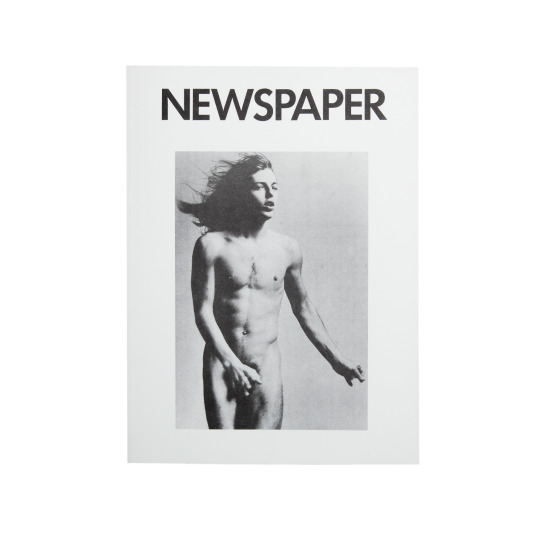


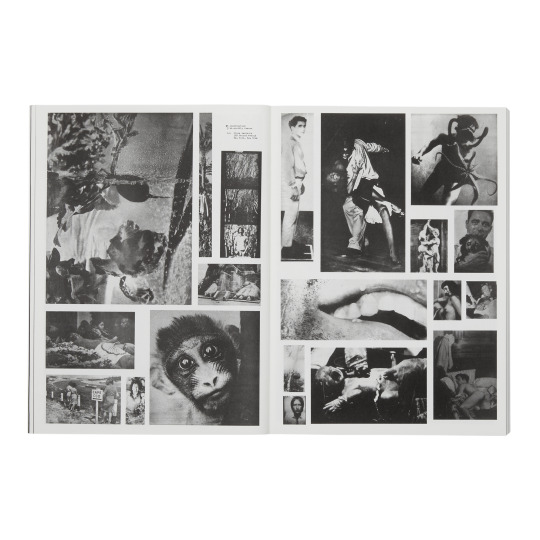

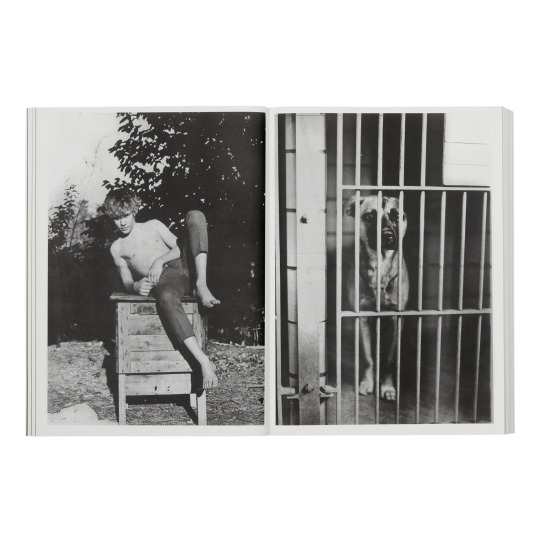
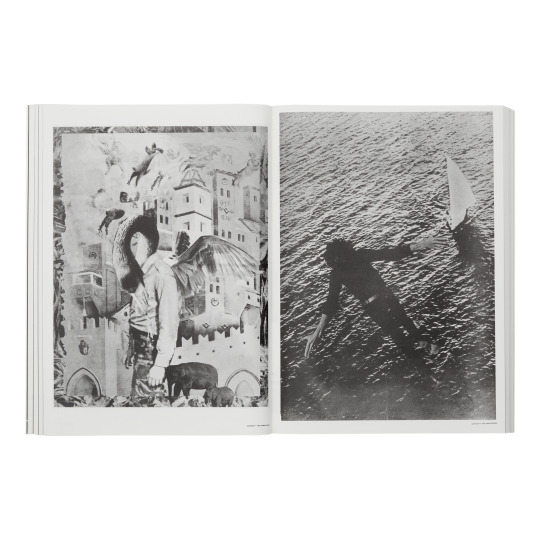


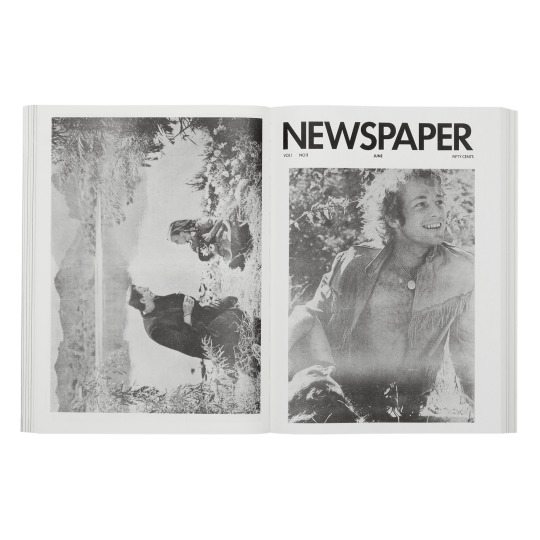

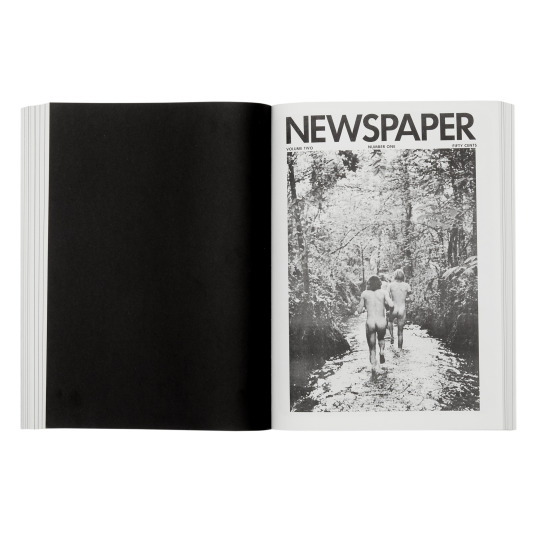
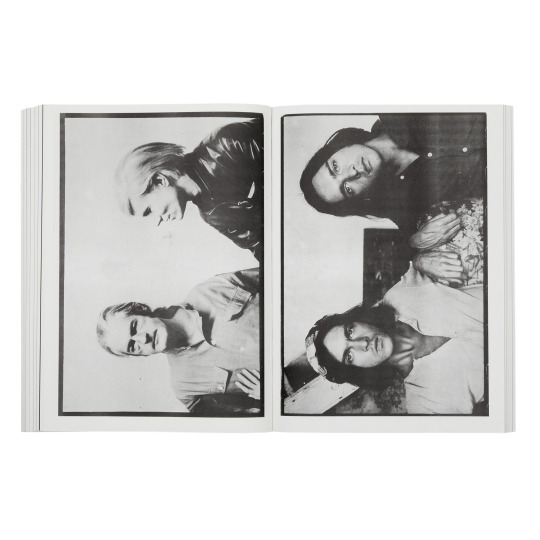
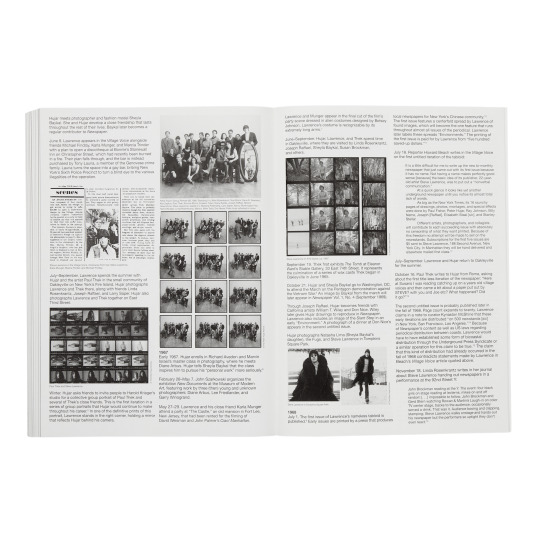
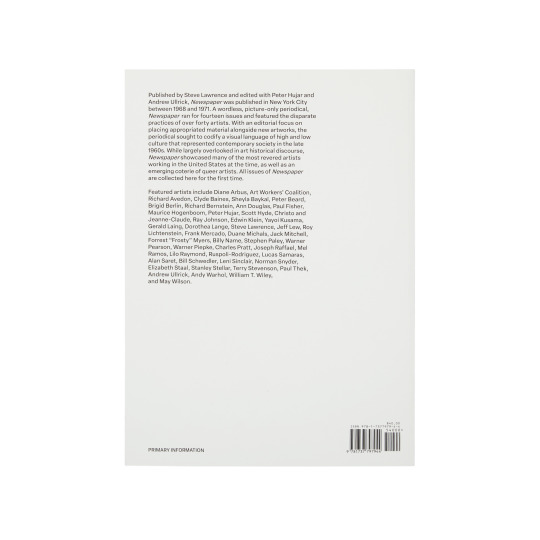
2023年9月15日
【新入荷・新本】
Various Artists Newspaper, Primary Information, 2023
416 pages. 9.75 x 13.38 Inches. Paperback. Edition of 4500.
価格:7,480円(税込)
/
1968年から1971年にかけてスティーヴ・ローレンスが発行し、ピーター・ヒュージャーとアンドリュー・ウルリックが編集に携わったニューヨーク発のタブロイド誌『Newspaper』の復刻版。
『Newspaper』は、言葉を使わず、写真だけを掲載した定期刊行物で、14号にわたって40人以上のアーティストの異質な活動を取り上げています。新しい作品と並行して流用された素材を掲載することに編集の重点を置き、1960年代後半の現代社会を象徴するハイカルチャーとローカルチャーの視覚的言語を体系化しようとしました。美術史的な言説からはほとんど見落とされているが、当時のアメリカで活躍し、尊敬されていた多数のアーティストと、新興のクィア・アーティストの仲間たちを紹介しています。
『Newspaper』は、1969年に創刊されたアンディ・ウォーホルの『Interview』や、レス・レヴィンの『Culture Hero』に先駆けるアーティストが発行するタブロイド誌のひとつですが、他のタブロイド紙とは対照的に、『Newspaper』はイメージに特化していました。
その全14号が初めてこの一冊にまとめられています。
Published by Steve Lawrence and edited with Peter Hujar and Andrew Ullrick, Newspaper was published in New York City between 1968 and 1971.
Newspaper was a wordless, picture-only periodical thatran for fourteen issues and featured the disparate practices of over forty artists. With an editorial focus on placing appropriated material alongside new works, the periodical sought to codify a visual language of high and low culture that represented contemporary society in the late 1960s. While largely overlooked in art-historical discourse, Newspaper showcased many of the most revered artists working in the United States at the time, as well as an emerging coterie of queer artists.
The mid to late sixties was a flourishing period for artists experimenting with new media formats such as books, records, and magazines to create or distribute their work. Newspaper was one of the first artist-published tabloids of its era, preceding Andy Warhol’s Interview and Les Levine’s Culture Hero, both of which debuted in 1969. However, in contrast to other tabloids, Newspaper focused strictly on images.
At a time when photography was not being exhibited regularly in galleries, Newspaper provided an alternative exhibition space for the medium and some of the era’s greatest photographers. The publication’s large size and unbound format encouraged readers to take it apart and hang its pages, which was how Newspaper was installed at the Museum of Modern Art’s influential Information show in 1970.
This is not to say that Newspaper only existed within the narrow confines of the art world, far from it. It lived within (and shared contributors with) a robust network of underground and queer periodicals like The New York Review of Sex, Rags, and Gay Power, among others. Yet, unlike many of these tabloids, Newspaper has largely disappeared from the discourse around underground magazines, queer publishing, and artists’ periodicals.
All fourteen issues of Newspaper are compiled in this volume for the first time.
Featured artists include: Diane Arbus, Art Workers Coalition, Richard Avedon, Clyde Baines, Sheyla Baykal, Peter Beard, Brigid Berlin, Richard Bernstein, Ann Douglas, Paul Fisher, Maurice Hogenboom, Peter Hujar, Scott Hyde, Christo and Jeanne-Claude Javacheff, Ray Johnson, Edwin Klein, Yayoi Kusama, Gerald Laing, Dorothea Lange, Steve Lawrence, Jeff Lew, Roy Lichtenstein, Frank Mercado, Duane Michals, Jack Mitchell, Forrest “Frosty” Myers, Billy Name, Stephen Paley, Warner Pearson, Jurgen Warner Piepke, Charles Pratt, Joseph Raffael, Mel Ramos, Lilo Raymond, Ruspoli-Rodriguez, Lucas Samaras, Alan Saret, Bill Schwedler, Leni Sinclair, Norman Snyder, Elizabeth Staal, Stanley Stellar, Terry Stevenson, Paul Thek, Andrew Ullrick, Andy Warhol, William T. Wiley, and May Wilson.
15 notes
·
View notes
Text

Trance Vortex 4 is out now!
CD1
01 DUMONDE See The Light
02 YORK The Awakening
03 MERLYN & CHUCK MELLOW Fünf
04 TIME MOTION PROJECT Pump This Party (Trance Edit)
05 RA CORPORATION Take Me To Heaven (De Donatis Mix)
06 WOODY VAN EYDEN Feels Like Flying
07 C-YURO Digilactic 2000 (FM Radio Edit)
08 C.M Dream Universe (Marino-S-Pace Radio Mix)
09 ALICE DEEJAY Will I Ever
10 KOSMONOVA Raumpatrouille
11 HOLE IN ONE Life's Too Short (Live At Paleis Soestdijk Radio Edit)
12 ENCORE! Le Disc-Jockey
13 NATURAL BORN GROOVES Groovebird
14 LUSTRAL Everytime
15 RANK 1 Airwave (Radio Vocal Edit)
16 CHICANE Sunstroke
17 666 Amokk
18 STEINBERG Interactive Phrase Dance (Radio Cut)
19 GREEN COURT Follow Me (Original Cut)
20 MEMBERS OF MAYDAY Sonic Empire (Short Mix)
21 OLIVE You're Not Alone
CD2
22 FRAGMA ft. MARIA RUBIA Everytime You Need Me (Radio Version)
23 SPACE FROG Lost In Space '98 (Cet Merlin's Video Edit)
24 DADDY DJ Over You (Ian Van Dahl Remix Radio Edit)
25 JAM X Can You Dig It?
26 DOUBLE YOU Dancing with an Angel
27 BT Embracing The Sunshine (Sasha's Remix Edit)
28 BALEARIC BILL Destination Sunshine (Departure Mix)
29 SPRING BEE Spring Tide (Dreamland)
30 RMB Reality
31 SASH! ft. RODRIGUEZ Ecuador (Klubbheads Mix)
32 FUTURE BREEZE Keep the Fire Burnin' (Radio Mix)
33 2 BROTHERS ON THE 4TH FLOOR Living in Cyberspace
34 RALPH FRIDGE Angel (7" Cut)
35 THE ULTIMATE SEDUCTION House Nation
36 BRAYDEN NOHAI ft. RUBBY Proxy Nebula (Reimagined 7")
37 POCO LOCO GANG Tropical Paradise
38 VENGABOYS Kiss (When the Sun Don't Shine)
39 SOLID BASE Ticket to Fly
40 MILK, INC. The Sun Always Shines on TV
41 PONT AERI Flying Free (Original Mix)
42 DELERIUM Silence (Fade's Sanctuary Remix Edit)
8 notes
·
View notes
Text
Hmmmm...
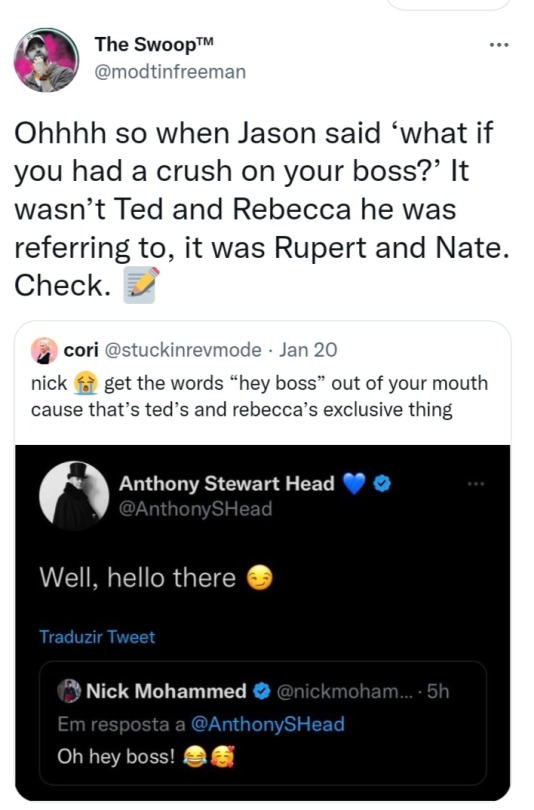
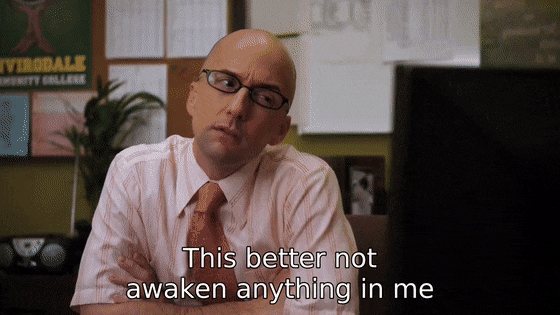
Or maybe I want it to.
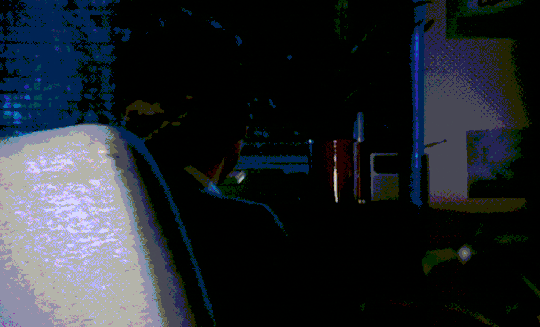
I respect Apple had AFC Richmond take to their socials to promote TED LASSO's series 3 teaser image.
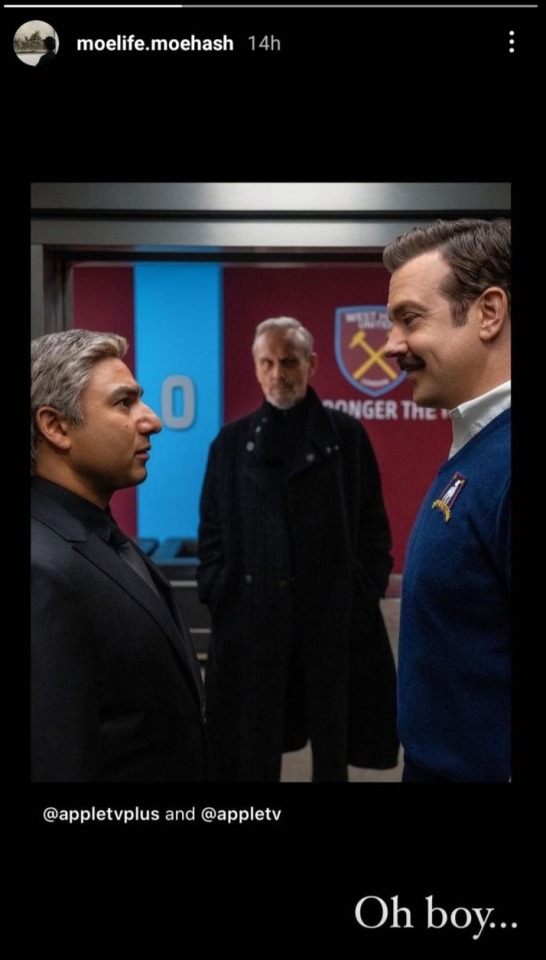
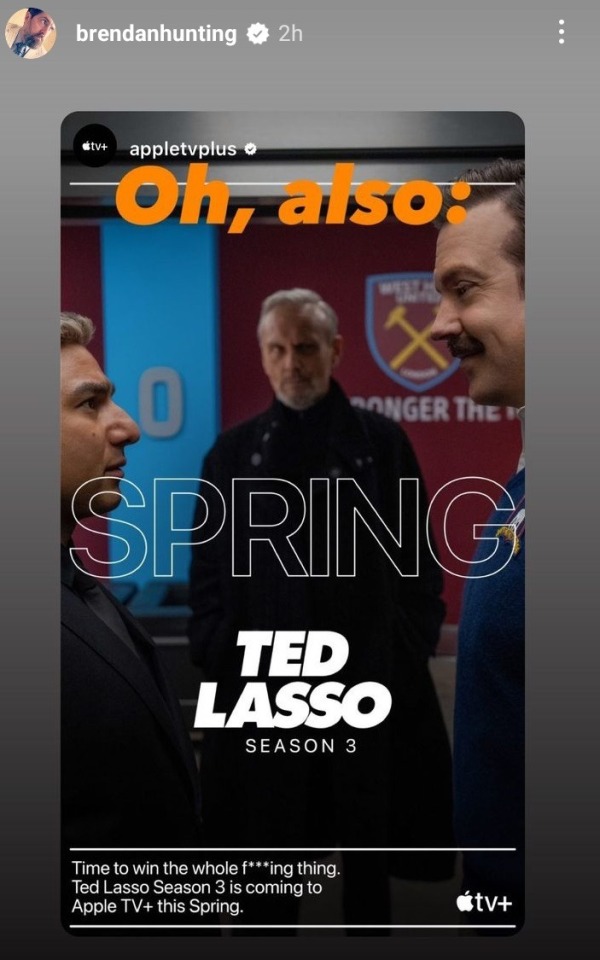


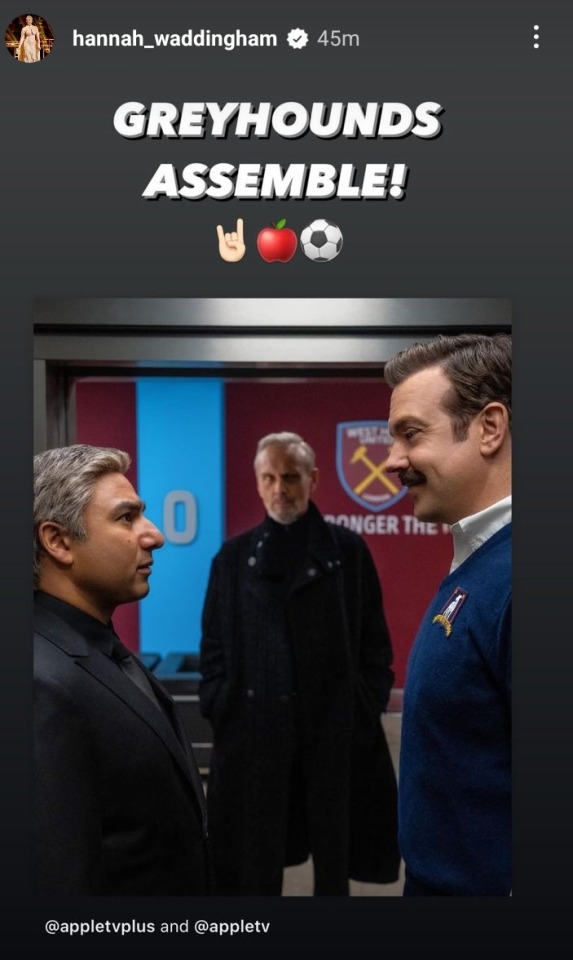



But as a spoilerphobe, I'm with Nick.

The cast also took time out to congratulate Brendan Hunt for appearing on Celebrity Jeopardy



and the debut trailer for Brett Goldstein and Bill Lawrence's upcoming series SHRINKING starring Jason Segal and Harrison Ford.




Sadly, the Paley Center for Media shuttered their gorgeous Los Angeles complex so our loss is New York's gain as Goldstein, Lawrence and some of the SHRINKING cast (including Lawrence's wife Christa Miller (SCRUBS, THE DREW CAREY SHOW), Michael Urie (UGLY BETTY) and Lukita Maxwell (Generation)) will be on hand at their Paley Center for a panel moderated by Zach Braff.
We do have our detractors, though. The cheek of Timothee Chalamet!
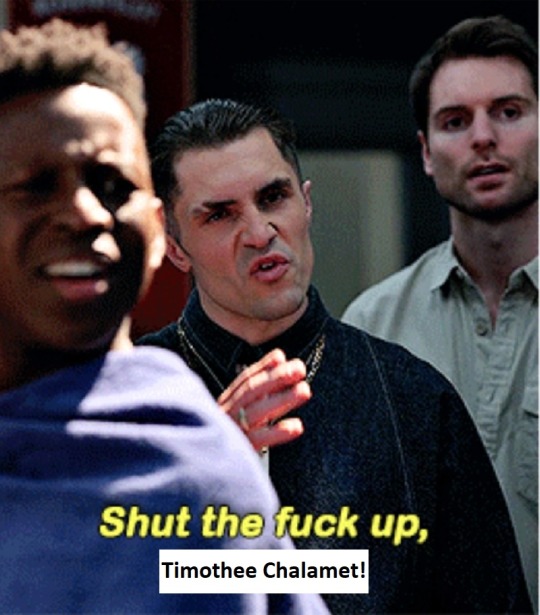
#bants#ted lasso#ted lasso cast#brett goldstein#hannah waddingham#toheeb jimoh#cristo fernández#brendan hunt#bill harris#shrinking#apple+#apple plus#streaming#moe jeudy lamour#timmy chalamet#timothee chalamet#davidelsendoorn#moe hashim#ted lasso alums
25 notes
·
View notes
Text

Henri Matisse, Woman with a Veil, 1927, oil/canvas (Museum of Modern Art, New York)
Because I am far too invested in Feud: Capote vs. the Swans right now, I had to look this painting up. This is the Matisse that Bill Paley bought off Princess Margaret to make it up to Babe after she caught him having an affair (again) with Abby Aldrich Rockefeller.
5 notes
·
View notes
Text
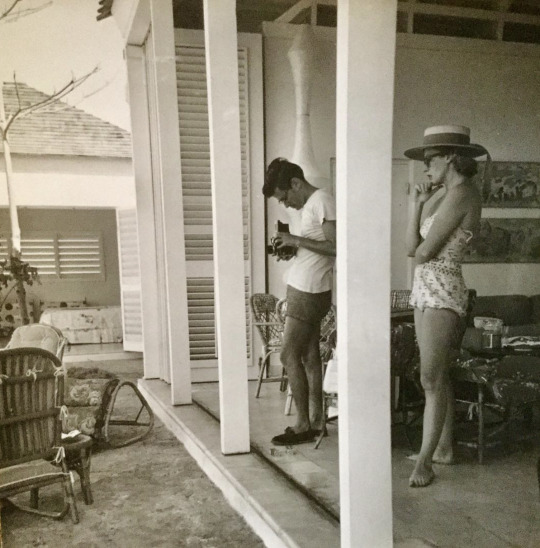
Slim Hayward (Slim Keith) and Richard Avedon at Bill and Babe Paley's Round Hill estate in Jamaica, 1950s.
#slim keith#richard avedon#swans#jet set#high society#ladies who lunch#truman capote#capote vs the swans#feud#babe paley#bill paley#kate paley#paley#leland hayward#1950s#slim aarons#william s paley#jamaica#round hill
3 notes
·
View notes
Text

Bernunzio Music: From the first run of 100 banjos built by Chuck Ogsbury in 1960, this is an Ode Style 21 longneck, serial number "I" or "1” (it is plausible that this could be the first built, though we can’t really know this for sure). At this time Chuck had yet to build his first "real" shop, and was still "learning the ropes" with Tony Jacobs, "a seventy-year-old wood worker" who had a shop in the North end of Denver (https://www.omebanjos.com/about/history-part-2/). Not only is this banjo truly a "historic" Ode, the back of its head has been signed by undoubtedly the most significant members in the Old Time, Folk, and Banjo universe; Mike Seeger, John Cohen, "Honest" Tom Paley, Pete Seeger, Eric Weissberg, Bill Monroe, Pete Wernick, Tony Trischka, and more. The rim assembly is the earliest all aluminum variety, with original tailpiece and metal hardware; some tarnish to plating overall. The three piece neck was made with beautiful highly flamed maple, with a walnut center strip; no Grade stamp is present on the peghead; guitarish shaped peghead, with rosewood fingerboard (32.5" scale), with abalone fretboard dots; equipped with original geared tuners. Extra holes present from a past Keith tuner situation, and a chip present on the side of the nut; ding on top of peghead, of course. A pre-truss rod instrument, there is significant forward bow, though it could certainly be capo'd and played in a longneck style.
#vintage banjo#fivestringbanjo#longneck banjo#ode banjo#pete seeger#mike seeger#tony trischka#bill monroe#john cohen#eric weissberg#tom parley
9 notes
·
View notes
Text

Kahlil Gibran's The Prophet: Directed by Roger Allers, Gaëtan Brizzi, Paul Brizzi, Joan C. Gratz, Mohammed Saeed Harib, Tomm Moore, Nina Paley, Bill Plympton, Joann Sfar, Michal Socha. With Liam Neeson, Salma Hayek, John Krasinski, Frank Langella. Exiled artist and poet Mustafa embarks on a journey home with his housekeeper and her daughter; together the trio must evade the authorities who fear that the truth in Mustafa's words will incite rebellion.
2 notes
·
View notes
Text


tonight's Selection
La Palina Nicaragua oscuro
Toro 6 x 50
The La Palina Nicaragua Oscuro's maduro Ecuadorian wrapper is perfectly paired with a binder and filler from Nicaragua to create a flavor profile that hints of leather, cedar, and milk chocolate. AJ Fernandez is the creator of this cigar.
The Nicaragua Oscuro Toro is one of two cigars La Palina makes at the A.J. Fernandez Cigar factory in Estelí, Nicaragua. This collaboration between AJ Fernandez and Bill Paley has created a rich and spicy, high quality cigar.
#cigar love#cigars#cigar lover#cigar aficionado#cigar enthusiast#epic smoke#cigar life#cigar lifestyle#cigar passion#cigar smoker#cigar smoker’s#cigar culture#aj fernandez#la palina cigars
2 notes
·
View notes
